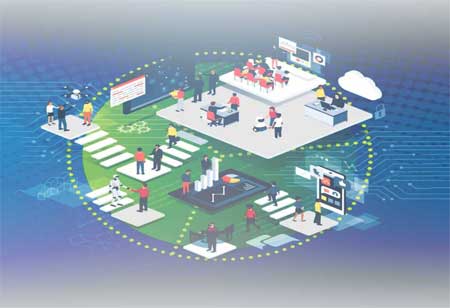THANK YOU FOR SUBSCRIBING
The Intersection of Human Resources and Digital Transformation
The fusion between Human Resources (HR) and Digital Transformation has emerged as a crucial element in determining the future of work.

By
Apac CIOOutlook | Wednesday, January 03, 2024
Stay ahead of the industry with exclusive feature stories on the top companies, expert insights and the latest news delivered straight to your inbox. Subscribe today.
HR and Digital Transformation form a dynamic, ongoing process shaping the future of work. Strategic integration empowers organizations to navigate digital challenges, fostering success in evolving landscapes.
FREMONT, CA: The fusion between Human Resources (HR) and Digital Transformation has emerged as a crucial element in determining the future of work. As companies adopt digital technologies to maintain competitiveness and agility, HR assumes a pivotal role in ensuring that the workforce adapts to these changes and excels in the digital era.
Recruitment and Onboarding in the Digital Age
Digital Transformation has revolutionized recruitment and onboarding procedures. AI-powered tools analyze resumes, evaluate candidate suitability, and even conduct initial interviews. Virtual onboarding platforms ensure seamless integration of new hires into the organizational culture, saving time and enhancing the overall candidate and employee experience.
Talent Management and Employee Engagement
Digital tools empower HR professionals to efficiently manage talent and boost employee engagement. Performance management systems offer real-time feedback and data-driven insights, enabling more informed decision-making. Employee engagement platforms utilize analytics to measure and enhance employee satisfaction, fostering a collaborative and motivated workforce.
Learning and Development in the Digital Era
The digital age necessitates continuous learning, and HR leads this evolution. Online learning platforms, e-learning modules, and virtual classrooms enable employees to acquire new skills at their own pace. HR uses data analytics to identify skill gaps and tailor learning programs to meet the evolving needs of the workforce, thereby enhancing employee capabilities and contributing to organizational agility.
Data-Driven Decision-Making in HR
The abundance of data in the digital era enables HR to make informed decisions. Individual analytics offer insights into workforce trends, enabling HR to optimize processes, identify high-performing individuals, and forecast future talent needs. Leveraging data in HR functions enhances strategic planning and ensures evidence-based decision-making rather than relying on intuition.
Employee Well-being and Work-Life Balance
Amid digital transformation, HR increasingly focuses on employee well-being and work-life balance. Digital tools aid in monitoring and managing stress levels, tracking work hours, and promoting a healthier work environment. HR crafts policies prioritizing employee well-being, ensuring that digital transformation enhances rather than detracts from the overall quality of work life.
Strategies for Successful HR Digital Transformation Leadership Buy-In: Successful HR Digital Transformation necessitates support from top leadership. Leaders champion the cause, highlighting the strategic significance of digital initiatives in achieving organizational goals.
Employee Involvement: Inclusivity is crucial in overcoming resistance to change. Involving employees in the transformation process, seeking their input, and addressing concerns fosters a sense of ownership and collaboration.
Continuous Learning Culture: To equip the workforce with digital skills for the future, HR advocates for a culture of continuous learning. Training programs, workshops, and access to learning resources are essential components.
Agile Implementation: Given the rapid evolution of the digital landscape, HR strategies must be agile to adapt to changing circumstances. Flexibility in implementation and a readiness to iterate on processes are critical for success.
Integration of Technology: Selecting and integrating digital tools that align with organizational objectives and enhance HR functions is crucial. Seamless integration ensures that technology harmonizes with current workflows rather than disrupts them.
The integration of HR and Digital Transformation is an ongoing and dynamic process shaping the future of work. Organizations strategically embracing this intersection navigate the challenges of the digital era and empower their workforce to thrive in an ever-evolving landscape. As HR continues to centralize workplace dynamics, the collaborative efforts between human and digital elements define organizational success in the forthcoming years.





